9 Ideas for Encouraging Your Kids to be Generous
A generous spirit is a quality I believe most parents long to see their children to possess. Kids who experience life through a generous lens are not only more apt to become generous adults but they’re also more inclined to volunteer, to support important causes, and to become more intentional stewards of their time, finances, and influence.
Matthew and I have long believed that one of the most important ways that we can help change the world is by encouraging our children to be generous advocates for justice, hope, and change.
Of course, that’s a whole lot easier said than done. Let’s face it; we experience some weeks when getting our kids out the door to school with combed hair, matching socks, and a lunch that includes items from every food group is a huge challenge. Fitting in an intentional, creative, and active experience on why it’s important to be generous seems pretty impossible.
While it can sometimes feel like we’re the only parents in the world who struggle to find the time to engage in extracurricular generosity, we know that we’re not. Most of our friends who have kids are in similar boats as us. Which is why I decided to ask some of my friends for advice/ideas on how they teach their kids about the importance of generosity.
What I learned is that, even though the majority of parents don’t have it all figured out and sometimes feel as though they’re parenting failures, lots of parents were able to come to the table with one good idea, something that works for their family.
But remember. These are just ideas to keep in your parenting toolbox. Pick and choose what works for you. And with every ideas that you decide to try, remember to make it age appropriate for your child.
1) Live generously. Nearly every parent I talked to said that one of the most important ways to teach generosity is to simply live generously. Be kind. Compliment often. Let your kids see (not in a showy way) you being neighborly.
Last summer when my mom was in town, the UPS man came to our door on a hot and humid morning. My mom asked, “Can I get you a bottle of water?” The UPS man, though somewhat shocked by the offer, said, “Ma’am, that would be amazing.” What mom did that day left not only an impact on my kids, it left an impact on me, too. So, keep a case of bottled water in the fridge. Give it away on hot summer days.
2) Contact your local public schools. Public school officials are often the first to know about a family’s need for assistance. Often, the needs are basic like school uniform apparel, school supplies, or pantry items. And in most cases, all needs and donations remain anonymous. On several occasions, the kids and I have put together a bag or two of new and gently used items to help a family or student at our local elementary school. With school starting soon, communities have many opportunities to help others.
3) Read fiction to your child. This advice from Colorado mom, Kathryn, might seem odd at first, but I think it’s fantastic! According to Kathryn, “Do all the voices when you read. Play pretend based on the stories you read to your kids. Immerse them in literature. A number of studies (including this one) suggest that those who read fiction [have] higher levels of empathy. And I think empathy is an extremely healthy basis for generosity.”
4) Share chores. Remember, generosity is about a lot more than just about giving away money and stuff, it’s about instilling the value of sharing, which that Jodi, a mom to 4 girls, tries to emulate at home. “We try to foster generosity within the family by sharing our household chores. Although we do give allowance, we do not pay for chores. Those are things we all do to contribute to the household. We often say, “Thanks for serving the family today”–not that the girls are always thrilled with this, but I’m not always thrilled to do chores either. We hope the takeaway is a regular reminder that life isn’t all about me, even within our little circle.”
5) Teach global awareness. “Whenever my kid—he’s 9—is learning about a city or state or country,” said a father who wished to remain anonymous, “we sit at the computer together and as we’re collecting the information that he needs for his report or class, I tell him about the challenges that the people in that particular country face. Last year, we talked about India and Poland and it was a really great way to help him learn not only the facts about a country but also about the good and not-so-good realities that people all around world encounter.”
For younger children, you can start even more simply, with books and coloring pages about the world.
6) Be ‘word’ generous. As a mom, one of the things that Sharon teaches her kids is that our words matter, which is why this Mississippi mom says, “[I tell my kids to] be generous with kind words and encouragement.”
7) Give your kids the gift of giving. John, a father of 3 boys, says, “Every Christmas, each kid gets a chunk of money to donate to any charity they choose. Among other things, it give us a chance to show them how to 1). Research and discover good charities, and 2). Think systemically about global problems and be strategic about giving.”
You can request catalogs from many non-profits to give your children a hands-on piece to look at, like this one from World Vision.
8) Celebrate birthdays with donations. “We do donations on birthdays,” says Meg, a mom in Cincinnati. “Each kid gets $20 to give to something their little pre-K hearts value.” Because her kids are still young, Meg adds, “I offer them 3 choices because they are tiny and can’t read.”
9) Sponsor a child. Our family sponsors a number of children through World Vision. Our first sponsorship began a year or so after Elias was born. That child’s name is Juan, and he lives in the Dominican Republic. Matthew visited him in April and it was so fun to get to FaceTime him!
Child sponsorship has been a great way to introduce our kids to the effects of poverty. They certainly can’t comprehend it fully. But child sponsorship has given us an ongoing connection to kids around their age who are affected in various ways to poverty and it’s been a good way to help our kids realize their abilities to help other people. You can sponsor a child here.
Speaking of World Vision, check out their PLAY-It-Forward Challenges: 10 fun family games that help your kids learn how to pay it forward this summer—with stories of real families who’ve made a difference. It’s an excellent resources that I know you’ll love.

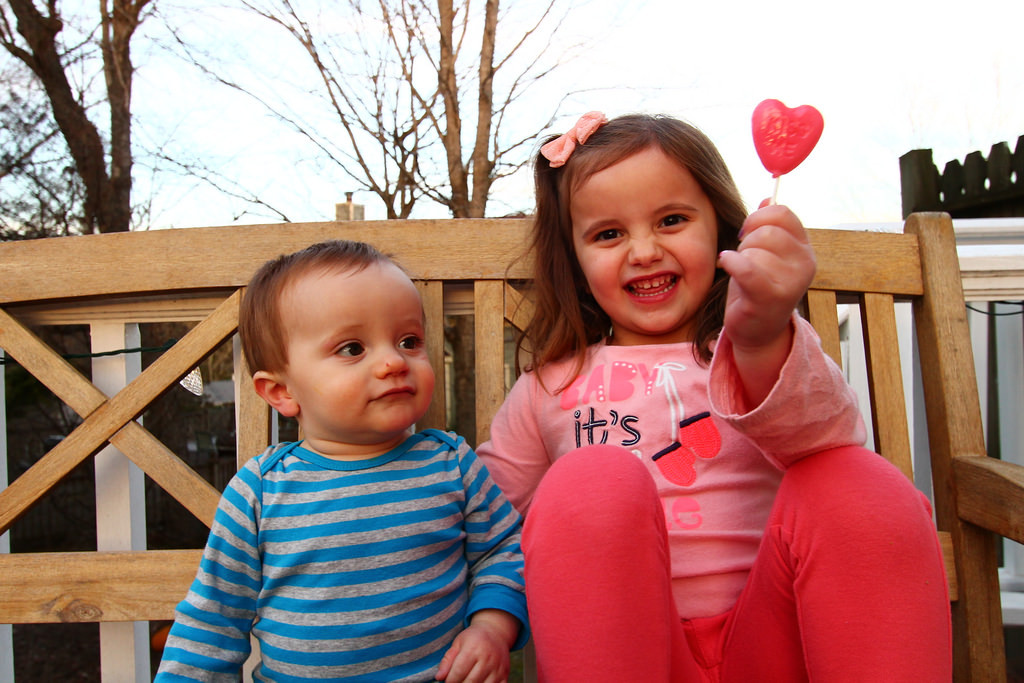
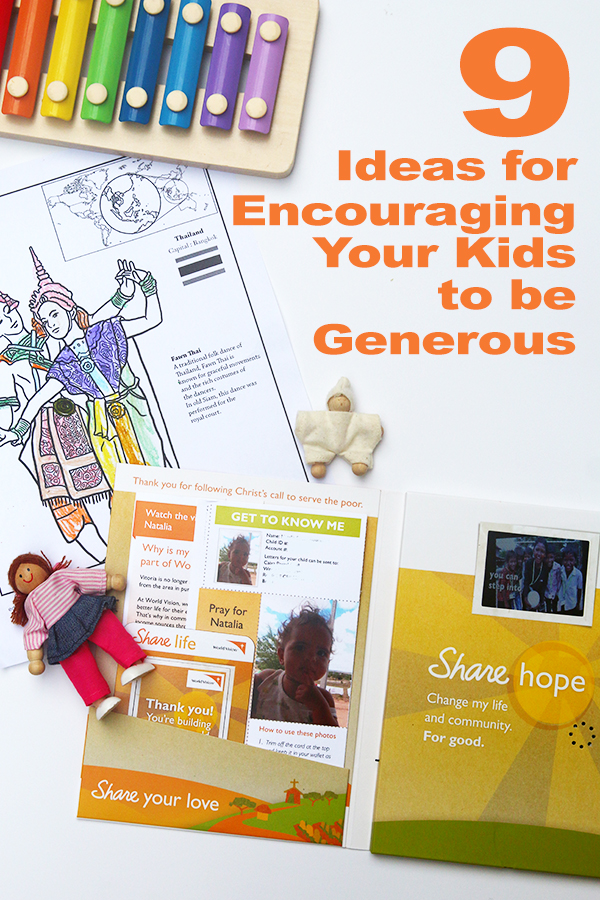
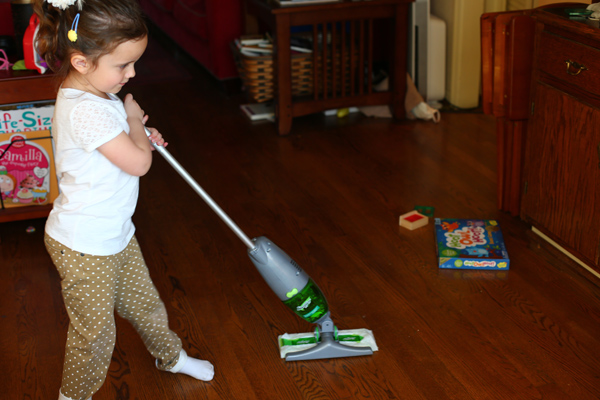
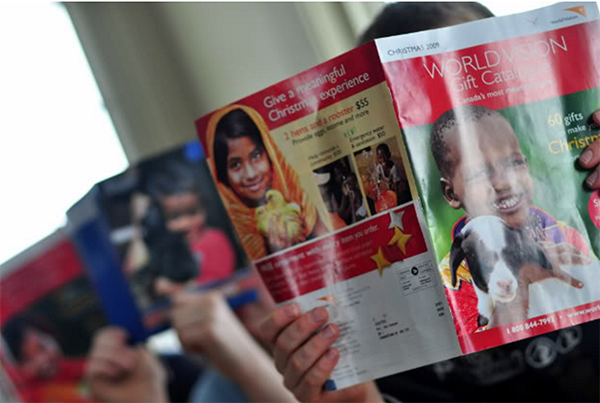
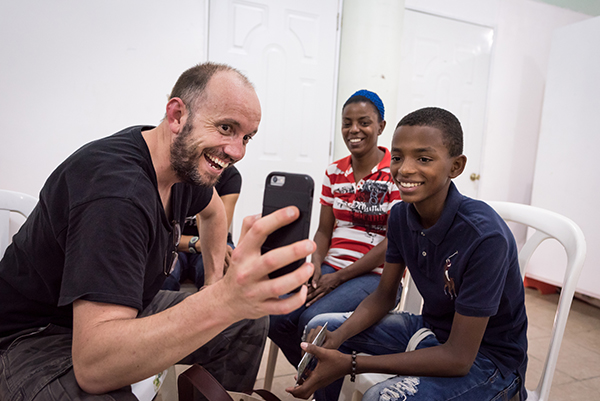
This is such a great post and definitely tips to live by. We’ve been focusing a ton in our house on being mindful of others!
Thank you for posting this — such great information and this post is a true reminder for me that children need to learn all things.
Cheers to you and this post! We need more of this in homes across the country.
This is a GREAT post. I was just thinking about this topic the other day. I especially like #6… I think it’s easy to overlook how we speak to each other impacts others, and I think it’s a lovely thing to work on INSIDE the home and build family relationships. Excellent read.
I love your post, Jessica. I believe in these principles and teaching them to my daughters has blessed my life in abundant ways I never expected. (Eph 3:20). I also believe in what World Vision does and I’m happy to have been a witness (and an interpreter) to Juan and his mom and how blessed they are because of your family’s selfless generosity. THANK YOU!
Thank you Jessica, what a wonderful post.
Great post Jessica! There has been so much research done on the benefits of leading our children in a generous life – benefits for the kids, the parents, and the recipients. Another great source of (free) tools and information is http://www.doinggoodtogether.org. So many parents have these thoughts in their hearts but just need a little help executing. You have provided some very easy and practical ideas!
Thanks so much for sharing our resources, Lisa! We love to empower families to make a difference and are always looking for new ways to reach those who need our resources.
Yes, to all of these ideas! Our nonprofit offers families a number of ways to serve others – from family-friendly volunteering to at-home service projects. But taking it beyond the obvious is helpful, too. We noted in our newsletters that chores are often the first chance for children to contribute. And big-hearted reading (we have book recommendations on our website) makes such a difference, such as giving children exposure to tough topics like hunger and homelessness and the importance of celebrating the elderly. We also have heard firsthand stories from children who’ve celebrated a birthday through the big-hearted act of serving others. Thank you for sharing this wisdom and encouraging more lessons in kindness!